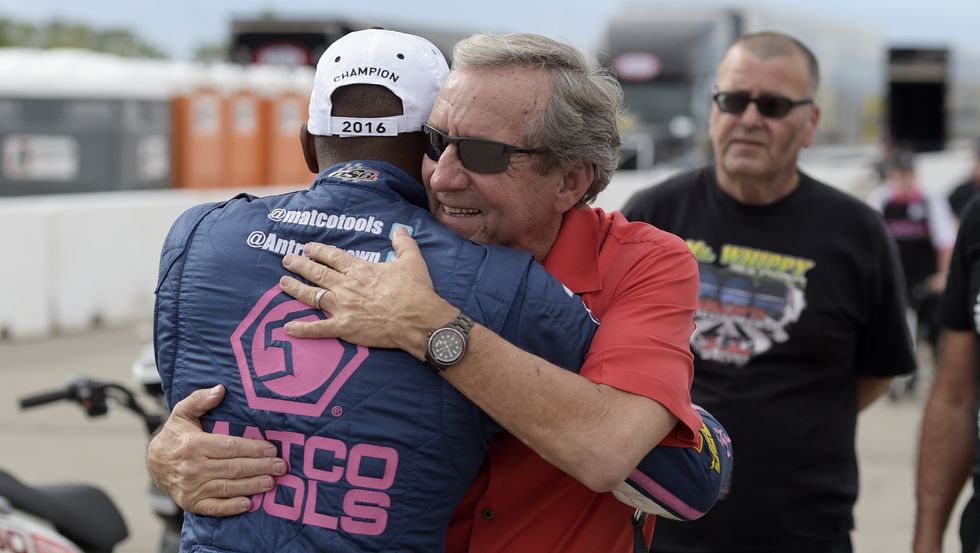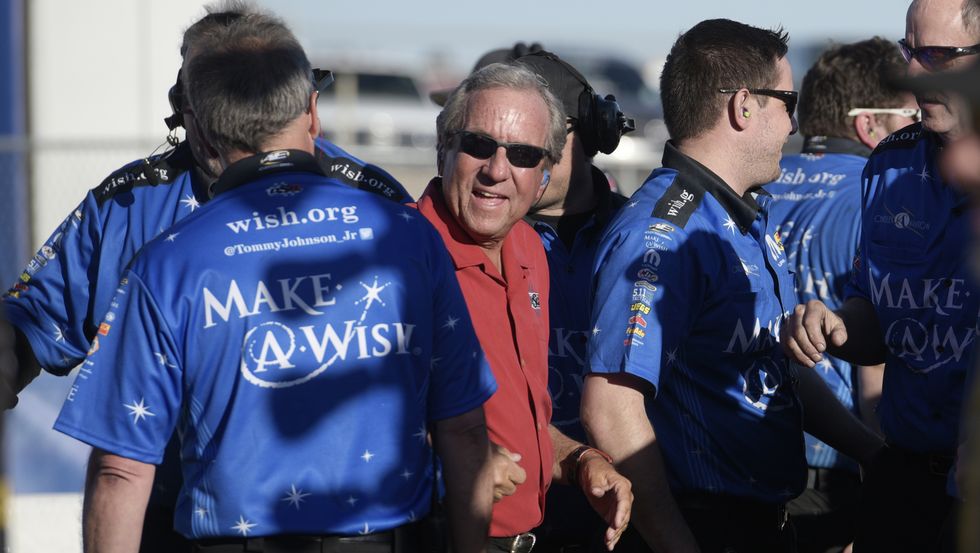- Don Schumacher, whose one-car team grew to as many as seven, orchestrated 367 event victories and 19 championships.
- He started as a match-racer in the 1960s and ‘70s and emerged as not only owner of a powerhouse operation but also a safety innovator, corporate giant, and philanthropist.
- Son Tony Schumacher, his motivation for returning to the sport from corporate America in 1998, still competes as the most successful Top Fuel driver with 86 victories.
Top Fuel ace Antron Brown saw it back in 2015, when his Hall of Fame boss at the time, Don Schumacher, returned to the dragstrip after a brutal battle with head and neck cancer.
“This is the best therapy,” Brown said. “You can see the smile on his face and the joy in his heart for being part of this sport of NHRA drag racing.”
Schumacher – the force behind the safety canopy for the 11,000-horsepower dragster and roof hatch escape for Funny Cars in addition to his company’s 19 championships and 367 victories – said, “I’m blessed with what I have accomplished.”
But the retired business mogul who settled in Jupiter, Fla., was cursed with the return of his cancer earlier this year. He passed away at age 79 Wednesday from complications of a months-long lung-cancer struggle.
“I love what I do, and I will continue to do what I do,” Schumacher said in his 2015 rebound. “I’m a businessman, and that’s what I do. I love racing. I love the sport of NHRA. I love my businesses. I love my family. I love what I do in life.
Schumacher leaves a lasting legacy on not only the NHRA community, where he etched his name as one of the sport’s most successful team owners and a champion for the advancement of safety innovation, but on the motorsports community as a whole. Schumacher’s contributions to the auto racing industry reach far beyond drag racing and have been widely recognized.
In November 2022, Schumacher was honored at the NHRA Awards Ceremony where he was presented with the NHRA’s Lifetime Achievement Award. In 2019, he was inducted into the Motorsports Hall of Fame of America in Daytona Beach, Florida, and in May 2013, he was enshrined into the International Motorsports Hall of Fame in Talladega, Alabama. He also joined a prestigious list of straight-line racing legends when he was invited into the International Drag Racing Hall of Fame in 2007.
A fierce Funny Car match racer in the 1960s and ’70s who fielded multiple entries with top-notch drivers to fulfill the demand for bookings of his Stardust Funny Cars, Schumacher took a departure from motorsports in the early ’70s to grow the family business, Schumacher Electric. While operating Schumacher Electric, he grew the family business into a global corporation. Schumacher increased the company value more than ten-fold and employed thousands of people around the globe, from Mexico to China.
In 1998, he returned to NHRA Drag Racing to build a team with son Tony Schumacher. Don Schumacher Racing (DSR) made its competition debut at the 1998 U.S. Nationals in Indianapolis, and by the time the 1999 season had wrapped, DSR had clinched its first of nearly 20 championship titles. Soon after, the single-car team exploded into a multi-car powerhouse.
As the patriarch of DSR, Schumacher was a force to be reckoned with. More than 25 drivers have raced for DSR. He created champions, introduced new personalities to the sport, and was responsible for the resurgence of several careers. Schumacher is the only team owner to have wins from each of NHRA’s four professional categories. He was also successful in the Factory Stock Showdown Series, winning the 2018 title in only his second year of campaigning cars in the category.
“I work very close with my crew chiefs and my assistant crew chiefs. I spend a lot of my time up in the trailers. I certainly don’t tell them how to tune a car or what to do,” he said. “It’s not a ‘spidey sense,’ not a ‘This feels right.’ It’s my knowledge and experience of working with a lot of people in a lot of organizations over my career.
“Besides the drag racing, I have another 2,000 employees on the other side of my business. In every company, you have to make decisions and look at the people who are there and coming up and moving around and make the decision to put the right people in the right place and to do the right thing at the right time. Undoubtedly that’s some unknown ability that I seem to have been lucky with,” Schumacher said.
His teams earned 19 NHRA world championship titles and 367 “Wally” trophies, including the five he won while driving a Funny Car. During his own racing career, he contributed cutting-edge safety innovations for the new Funny Car category including a roof-mounted escape hatch that allowed drivers to quickly exit when all-too-frequent fires occurred. He was also the first to mount the lever that activated a fire suppression system on his Funny Car’s brake handle so the driver could apply both while keeping one hand on the steering wheel.
As a team owner, he funded and spearheaded a project to develop a protective, enclosed canopy for Top Fuel dragsters, which has since been adopted by multiple NHRA teams.
Schumacher was also intent on utilizing his team’s fleet of race cars to raise money and awareness for various charities. Each year ahead of the U.S. Nationals, DSR hosts a pre-race event at its Brownsburg, Ind. headquarters to benefit Riley Hospital for Children, and for seven seasons, Schumacher, along with Terry and Doug Chandler, campaigned ‘giving cars.’ The program enabled non-profits, such as the Infinite Hero Foundation, Make-A-Wish Foundation, and MD Anderson Cancer Center to be recognized through a dedicated tribute livery at no cost to the organization. The impact Schumacher had both on and off the race track is undeniable.
In more recent years, Schumacher turned his focus to growing Don Schumacher Motorsports, more commonly known as DSM Precision Manufacturing and DSR Performance. DSR Performance is considered one of the sport’s leading race engineering and aftermarket parts brands. DSM Precision Manufacturing is a successful precision manufacturing supplier for the motorsports, defense, and aerospace industries. These entities will continue to honor the business legacy of Schumacher.
When not at a racetrack or leading his teams of employees, Schumacher enjoyed spending time with his children, grandchildren, fishing, and golfing.
Although his ordeal with cancer didn’t diminish his spunk or his aggressively competitive spirit, Schumacher made a huge concessions when he completed his radiation treatments: “I have to say I love more people today than I did prior to that diagnosis. There’s a lot more love out of me today than there’s ever been.”
He still had his rivalries, most notably with 16-time champion and No. 1 on-track nemesis, John Force. However, Schumacher said, “It’s a whole different frame of what life is really about. Everybody that I’ve talked to that has gone through cancer says it changes you . . . changes, really, your philosophy of life and people and friends and love. It changes what irritates you and aggravates you, which is really meaningless when you look at the big scope of it,” Schumacher said. “Family and friends and the people you surround yourself with are really the important ones.
And the sport loved him back.
Arrangements, including a celebration of life ceremony, will be announced later. In lieu of flowers, the family suggests donating to MD Anderson Cancer Center at Houston.
Susan Wade has lived in the Seattle area for 40 years, but motorsports is in the Indianapolis native’s DNA. She has emerged as one of the leading drag-racing writers with nearly 30 seasons at the racetrack, focusing on the human-interest angle. She was the first non-NASCAR recipient of the prestigious Russ Catlin Award and has covered the sport for the Chicago Tribune, Newark Star-Ledger, and Seattle Times. She has contributed to Autoweek as a freelance writer since 2016.
Read the full article here




